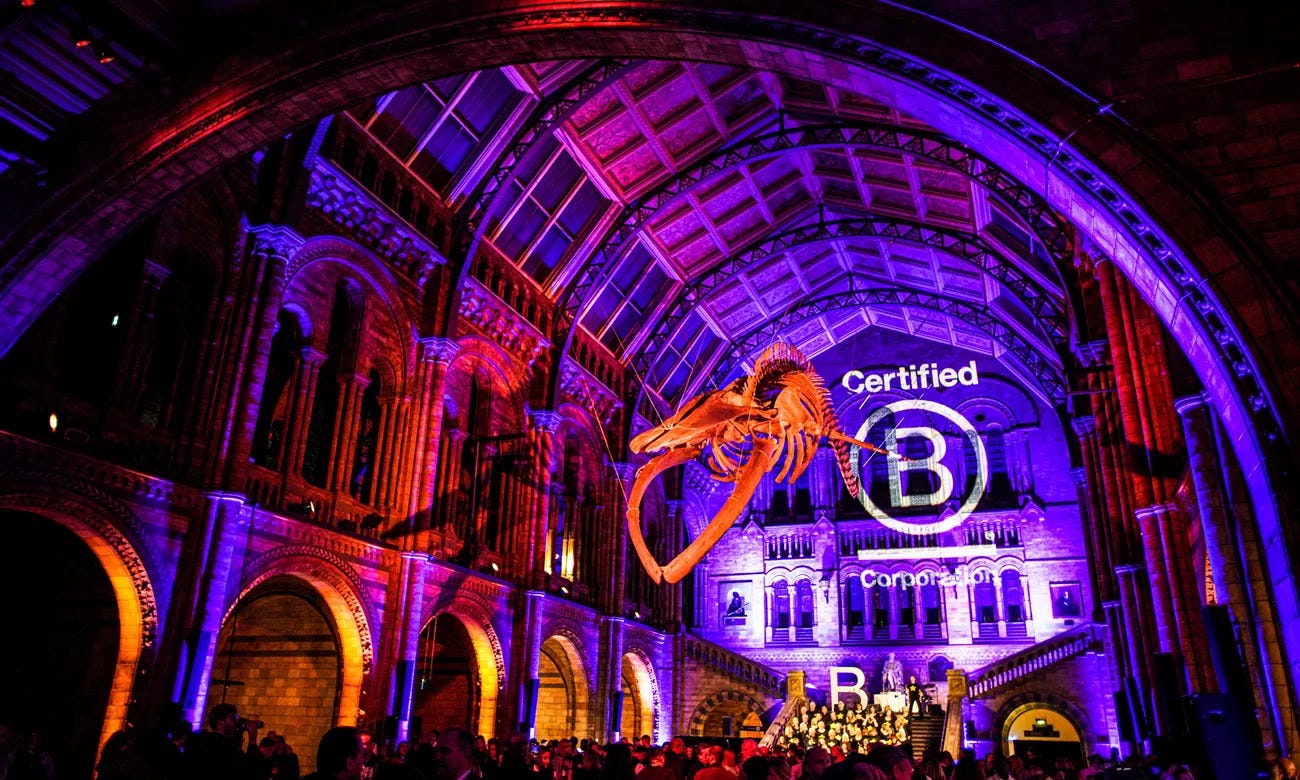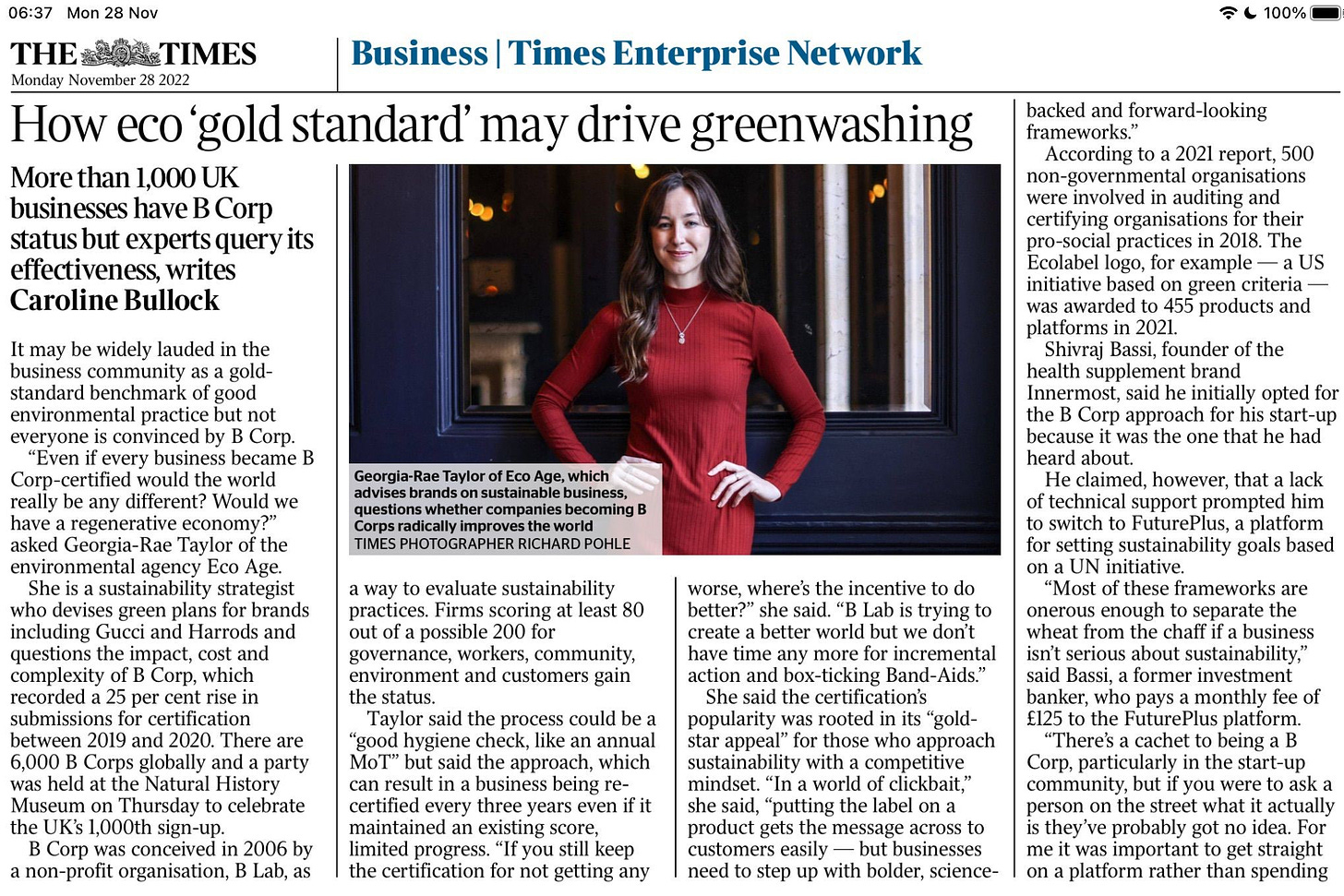

Discover more from Oxymoron
My psychic powers seem to be strong recently. On Black Friday I published an article about whether the world would be better off without advertising, oblivious to what day it was. Then I started writing today’s article the night before The Times published an article about B Corps on almost exactly the same topic, albeit with a very different perspective. Now I feel that I can’t publish today’s article without some acknowledgement of the one in The Times.
So what’s all the fuss about?
The B Corp community recently celebrated the landmark of 1000 companies achieving certification in the UK. When my business, Wholegrain Digital, first certified in 2017 we were the 127th B Corp in the UK. This recent landmark shows how the B Corp movement has grown rapidly in the past few years.

If you’re not familiar with B Corp Certification, I would describe it as probably the most rigorous independent and universal certification of responsible business practices. It can be applied to any size or type of business, from a small consultancy to a global food business. B Corp is run by the non-profit B Lab and aims to set high standards in corporate governance, worker welfare, environmental protection, community engagement and customer impact. In addition to small businesses like my own, the B Corp movement also includes an increasing number of household names such as Innocent Drinks, Patagonia and Pukka Teas.
The article in The Times was a response to the celebration of the UK having reached a thousand B Corps, and it had a distinctly negative tone. It starting with the headline “How eco ‘gold standard’ may drive greenwashing”.
The article starts with Georgia-Rae Taylor of sustainability consultancy Eco Age, asking whether the world would be any different if every company was a certified B Corp and whether we would then have a regenerative economy. Questions that I had literally typed in this article the night before!
The article then went on to quote Georgia-Rae criticising B Corp Certification as not being good enough and saying that “businesses need to step up with bolder, science backed and forward looking frameworks”. However, she fails to give any real examples of anything better.
This is where the similarities between the article I am writing and the perspectives in The Times diverge. As I wrote in an earlier post about perfection, sustainability at this point in time is not a clearly defined destination. Sustainability is a direction of travel.
To reject progress because it’s imperfect is to stand in the way of progress, something that I think The Times is particularly good at. I can’t help but think that the article was purely written to appeal to their conservative readership and that Eco Age got lured in by the promise of some cheap publicity. Maybe The Times quoted Georgia-Rae out of context. I hope that is the case.
A large number of leaders from B Corps in the UK (including Wholegrain Digital) collectively signed an open letter to The Times in response, sharing the benefits that we have experienced having actually gone through the certification process and joined the B Corp community to improve our businesses.

But enough of that!
OK, so having been sidetracked by the article in The Times, let's get back to the more interesting questions that I was hoping to cover, and which to be fair, Georgia-Rae also raised.
We might suppose that the ultimate goal of an organisation like B Lab might be that one day, all businesses would be Certified as B Corps. Or at least that they would all follow similar principles to B Corp, perhaps based on legislation like the Better Business Act, which B Lab are championing. For someone like me who believes that businesses need to be an integral part of any social and environmental progress, this hypothetical vision of the future is very exciting.
Now take another moment to imagine that world. Imagine that all 5.5 million1 businesses in the UK and all 330 million2 businesses worldwide are Certified B Corps or equivalent. Pause and take a moment to picture this in your mind.
What would this world look like?
I have no doubt that it would be a far better world than we have now. The average level of corporate responsibility toward the environment, employees, suppliers and local communities would be notably higher than it is now. That can surely only be a good thing. Surely that is what most of us are striving for, including Eco Age and many readers of The Times.
I also think that this new world would not be perfect. When we reached that point, we would see that we still had a very long way to go. In fact, even if every company in the world then managed to achieved the elusive top score of 200 points in the B Impact Assessment, I still think that we would have a long way to go.
B Corp is not an end goal, but a tool to accelerate progress. It pushes us forward, gives us a framework for improvement, a community to support us, and sets a positive direction of travel. It might not be the perfect final destination, but it’s an important stepping stone along the way and a force for change. I have personally experienced the benefit of the B Corp framework and community in my own business. I can honestly say that Wholegrain Digital has transformed as a company as a result of the challenge, accountability and support that we have gained. I have not seen or experienced any single thing more effective at driving a business to be more responsible, and trust me I have been looking.
With all that said, I am on a quest to figure out what sustainable business really means and I can’t help but wonder what a business would look like if it was even better than the best rated B Corp.
Going beyond B
I've always been curious to know what the B in B Corp officially stands for. I think it stands for ‘Benefit’ or ‘Better’ but whenever I've asked people who work at B Lab, they've always been non-committal. Perhaps it doesn't stand for a word at all. Perhaps it's a grade!
In his book, Better Business, Christopher Marquis refers to ordinary businesses as C Corps. If I remember correctly, Chris used the C to stand for ‘Conventional’ but there are other words beginning with C that could also work.
So, if a conventional business is a C Corporation and better businesses is a B Corporation, would an angelic business be an A Corporation? What would it take to get an A grade?
I’ve been giving a lot of thought to this. In my mind, an A Corporation would be truly in harmony with a healthy society for all, and in harmony with nature. I imagine that it would produce goods that are truly of value to people, would operate in a collaborative fashion, treat its customers as equals, treat its suppliers as equals, respect local cultures, utilise natural resources frugally, locally and in harmony with the cycles of life, and reinvest profits for the best interests of society. It wouldn’t just do one of these things… it would do all of them. If there is such a thing as a regenerative business, that is what an A Corp would be.
The B Corp certification process doesn’t require companies to perfect any of these things but it does focus attention on similar areas of impact and provide a framework for improvement. Furthermore, if you want to aim for the stars and dream of creating an A Corp, the B Corp community is one of the best places to find visionary, passionate, motivated people to help you get there.
So where are the A Corps?
I am yet to find a business that I personally feel meets my own vision for an A Corp, but that doesn’t mean that none exist. Perhaps Georgia-Rae Taylor knows where they are all hiding.
Despite not knowing where they are though, I believe that the future depends on us learning how to create and operate A Corps on a large scale. I think the reason that they are currently so hard to find has nothing to do with any individual business or the structure of any certification scheme like B Corp. The way we currently run businesses, structure certification schemes and define ‘best practices’ is based on our current social and economic paradigm. We are all operating within a system of infinite growth extractive capitalism, even if we are trying to rally against it.
We need to change the way we run businesses and we need to keep pushing new boundaries in what that means. We also need to recognise that we need to radically change the fundamental nature of the global society that we live in - our culture, our technology, our political system, our power structures, our monetary system and our collective consciousness.
We need to drive progress from all sides, to improve ourselves, to improve our organisations and to improve the structures that underpin our society. In doing so, we need to support each other positively and embrace any tools or frameworks that can help us on our way. B Corp is one of the best we currently have.
On that note, I am way behind on our B Corp recertification and I need to get cracking!
P.S. Apologies for no audio version this week. I’ve been traveling to and from Barcelona by train to present a keynote at the International Green Digital Accessibility Conference and I don’t have a decent microphone or quiet space.
P.P.S if you’re curious, the highest rated B Corp in the UK is currently YOU Underwear.





A very good article and I like the "Sustainability is not a clearly defined destination, but rather a direction".
SproutWorld has been a proud B Corp member since 2021, and we use the tool to, as you write, to accelerate our progress and see where we do good and where we can do even better.
But I am incredibly disappointed to discover that copyists also become B Corp certified. We hold the patent on our product worldwide, but a UK company is selling copies, and B Corp will do nothing about it but call for dialogue between us and him/them. But they won't talk to us. As a small business, we spend a lot of money and a lot of time-fighting copycats. I think this is a huge problem at B Corp. THis showes a leak in the certification progress.
Excellent article - as always.
Re the discussion about "Going beyond B": have you seen the Doughnut Economics work on a business toolkit? I think it is an interesting complement to the B Corp BIA.
( The toolkit: https://doughnuteconomics.org/tools/191 & their launch video https://www.youtube.com/watch?v=UoRU3E6eigc )